Last week I spent a considerable amount of time watching the confirmation hearings for Amy Coney Barrett. Remarkably, just weeks before a contentious presidential election taking place in the midst of a global pandemic and historic political polarization, the hearings were quite civil. In fact, at times they were almost boring—something few observers were expecting in light of the raucous Supreme Court confirmation hearings of the recent past.
Though the hearings were not entirely absent of fanfare or posturing, both the Democrats and Republicans on the Senate Judiciary Committee were largely respectful toward one another and toward Judge Barrett across dozens of hours of televised proceedings. Again, this is all the more noteworthy because such high-stakes events typically breed theatrics instead of thoughtful discourse. But the senators, even amid their disagreements, managed to maintain both decency and decorum. And most significantly, Barrett herself was incredibly poised. Even in the greatest moments of scrutiny or pointed inquiry, she maintained a calm demeanor and responded to questions with kindness and, when necessary, self-restraint.
In these tumultuous times, the proceedings were actually something of a bright spot. Seeing national leaders disagree in an agreeable fashion reminded the more jaded among us to keep hoping that better days are ahead for the republic. And speaking of hope, nothing was more heartening than the moment that marked the conclusion of the hearings. As they rose from their chairs at the dais, two senators, Lindsey Graham, the Republican Chairman of the committee, and Diane Feinstein, the committee’s ranking Democrat, exchanged a brief hug before exiting the room.
Civility isn’t optional
Confirming a judge to the Supreme Court is always important. But those hearings were significant for another reason. They demonstrated something that many of us assumed was no longer possible. Last week we saw elected officials with wildly divergent political views put those differences on display. Yes, they openly criticized one another, sometimes going too far in their rhetoric and critiques. But there were no notable uncontrolled outbursts, nor did anyone speak to the nominee or opposing party with contempt. At a time when many expected chaos, a great deal of civility was demonstrated for the world to see.
Civility often comes under attack for being impractical or unrealistic. People think civility is great when it comes to friendships and families or communities and churches, but not for politics. When it comes to politics, we’ve been catechized to see our opponents as enemies. Instead of working to defeat them, we often aim to destroy them. Politics is zero sum, winner take all. What place is there for civility?
Certainly there are many people who view politics as such a Machiavellian enterprise. But if that is all there is to politics, then politics has no place among the people of God. Jesus, after all, instructed his people to love our enemies, to pray for those who persecute us, and to do good to those who would do evil unto us (Luke 6:27-36). Ruthless, bare-knuckle politics isn’t an option for believers because we never have the option of disregarding the commands of Christ. Upholding human dignity is more important than securing political victories.
Civility and politics
Fortunately for us, the choice between political hackery and abstention from the political process actually represents a false dilemma. And though they seldom make headlines, across the country there are countless public servants and elected officials who are committed to fulfilling their sworn duties in ways that honor even those with whom they most strongly disagree. These men and women model a commitment to civility because they understand what it is and why it matters.
Christians can and should engage in politics. But they must always do so as Christians, with their priorities in the right order.
Civility does not call us away from our disagreements. Instead, it calls us to disagree in ways that promote and cultivate the kind of society we wish to live in. Whatever your politics, all of us can agree that we would like to live in a society where we are free to persuade others and to be persuaded by them. Few among us desire coercion and tyranny. Rather, we want to live in a society that promotes decency, respect, kindness, and understanding, instead of one that is cruel and uncharitable where saying or believing the wrong thing brings the risk of being fired or ostracized or cancelled.
Interestingly, public opinion has rewarded Barrett for the manner in which she conducted herself during the hearings. People found her calm and reasonable manner refreshing. They found her kindness and sincerity to be desirable traits for a public servant. We would do well to remember that the next time someone implies that the high road cannot lead one to victory or success.
Civility and the gospel
But beyond seeking success, Christians should embrace the mantle of civility for a different reason: the gospel. The Apostle Paul told us that Jesus came into the world to save sinners (1 Tim. 1:15). People, in other words, are the mission. And people are more important than politics. If your political views cause you to treat other people badly, then perhaps you’ve fallen into idolatry. You can be political without being sinful. You can be passionate without being belligerent.
Christians can and should engage in politics. But they must always do so as Christians, with their priorities in the right order. Civility is not an option for believers, because civility is ultimately just a baseline for applying the most rudimentary duty of New Testament ethics—to treat others as we would have them treat us (Matt. 7:12). Embrace civility for the sake of the gospel.
Photo attribution: Pool / Getty Images News from Getty Images North America










